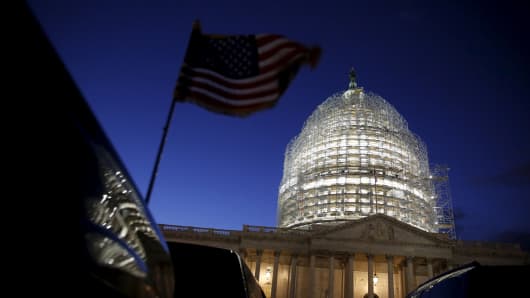Dissatisfaction and distrust of Washington. D.C. was a powerful part of Donald Trump's stunning victory. So congratulations to the Trump supporters: you've now got a real D.C. outsider on the inside. One who says he's ready to make changes.
The question is, what kind of changes to the federal government could the President-Elect make that would soothe the anger of his base?
Well, how about a change that might also help fix one of the other big hot button issues in America, particularly on the left: wealth inequality.
Yes, a plan that maybe, just maybe, helps fix a little of both. I'll get to it in a second, but first, the backdrop.
One thing the election taught us was that for many Americans, D.C. is less an actual place than some kind of wealthy, far away land unrelated to their daily lives. You could substitute "Narnia" for "the nation's capital" and few would care. Outside of the military, millions of Americans have probably never even met a federal worker, fostering that old "us vs. them" thing.
For the many others who live in or around Washington, or have visited recently, you've seen the growth, and the money, first hand. The counties surrounding D.C. are some of the richest in America. Maryland has a higher percentage of millionaire households than any other state, despite being home to fewer than half the number of Fortune 500 companies as the similarly-sized Massachusetts. Virginia and the District also both rank in the top 10 for richest states. Take the Metro to the moolah.
The D.C. area's real estate market suffered far less than most in the financialcrisis, if for no other reason than a constant inflow of people. Washington's population will soon set a new record. Loudon County,Virginia was a farm community when my family moved to Virginia in 1985. It now consistently ranks among the fastest growing, and richest, counties in America.
Companies increasingly find the Washington area a seductive draw. Defense contractors Lockheed Martin, Northrup Grumman and General Dynamics used to be based in California and Missouri. They're now headquartered in Maryland and Virginia; a short limo ride to Congress. Who can blame them? If you need money and power, go to where the money and power are.
Though the size of federal government payroll hasn't grown much in the past twenty years, the companies who lobby, consult, sell to and buy from the incredible number of federal agencies has mushroomed. In fact, the federal government has become so complex, even the government itself cannot agree on how big it actually is!
Before all you Marylanders and NOVA, (that's "Northern Virginia" to the insiders), dwellers hit 'send' on that nasty gram, no one is knocking you or the area. As a Hokie, I've got a lot of friends and family in the region. You're good people. But, good people, you also probably know the area is close to being maxed out. It's full. New houses are popping up faster than federal agencies. My hometown, despite being 70 miles west, has somehow morphed into a quasi D.C.suburb over the past 20 years. FEMA built a massive new building there. People are commuting hours to get to work. I would suggest BMW officially sponsor the beltway, but I doubt the automaker wants its name associated with some of the worst traffic in America. What's the German phrase for "total standstill?"
So here's my plan: move D.C. Actually, move some of D.C. Physically. Spread the capital, andi t's wealth, around America.
The IRS has about 90,000 employees. Why not move a few thousand of them to Youngstown, Ohio? Move part of the Department of Agriculture to Jackson, Mississippi. Added benefit: there's actually agriculture there. Stockton, California? Meet your new 5,000 Commerce Department neighbors. Department of Labor? Do some labor in Lexington, Kentucky.
Physical proximity to an office mattered for most of D.C.'s 200-year evolution. Collaboration meant crossing the street. You had to all be shoved into 70 square miles to get anything done. Not anymore. Work is fluid. Miles don't matter.
Right now you're saying, "nice idea, but the federal workers would never be told to move."
You're correct. However, the plan would be optional for current employees and only required for new ones. In other words, you give people the choice to move, but make many of the new hires work in the new areas. One might be surprised at how many D.C. types may be willing to pack up and move when they see how far their paychecks go outside of the area. Eighty grand a year will get you a lot of house in Ohio.
Can you imagine the economic benefits of bringing in a few thousand federal workers to economically depressed areas? A massive, immediate boost to regions that need it most. Real estate, retail, restaurants all benefit. Entire cities could be saved.
Plus, it's about people, and helping the government be more of and by the people. You would realize Phil* isn't some big scary government guy. He's just Phil.
So c'mon D.C., share the wealth! You can afford it.
* Not a reference to anyone real. Though I'm sure there is someone atthe IRS named Phil, I just made this particular Phil up.



